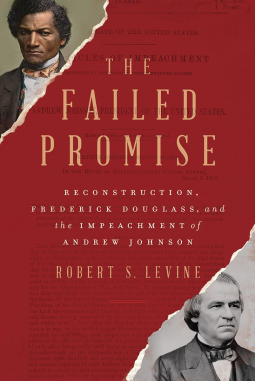
The Failed Promise
Reconstruction, Frederick Douglass, and the Impeachment of Andrew Johnson
by Robert S. Levine
This title was previously available on NetGalley and is now archived.
Send NetGalley books directly to your Kindle or Kindle app
1
To read on a Kindle or Kindle app, please add kindle@netgalley.com as an approved email address to receive files in your Amazon account. Click here for step-by-step instructions.
2
Also find your Kindle email address within your Amazon account, and enter it here.
Pub Date 24 Aug 2021 | Archive Date 31 Jul 2021
Talking about this book? Use #TheFailedPromise #NetGalley. More hashtag tips!
Description
Robert S. Levine foregrounds the viewpoints of Black Americans on Reconstruction in his absorbing account of the struggle between the great orator Frederick Douglass and President Andrew Johnson.
When Andrew Johnson assumed the presidency after Abraham Lincoln’s assassination, the country was on the precipice of radical change. Johnson, seemingly more progressive than Lincoln, looked like the ideal person to lead the country. He had already cast himself as a “Moses” for the Black community, and African Americans were optimistic that he would pursue aggressive federal policies for Black equality.
Despite this early promise, Frederick Douglass, the country’s most influential Black leader, soon grew disillusioned with Johnson’s policies and increasingly doubted the president was sincere in supporting Black citizenship. In a dramatic and pivotal meeting between Johnson and a Black delegation at the White House, the president and Douglass came to verbal blows over the course of Reconstruction.
As he lectured across the country, Douglass continued to attack Johnson’s policies, while raising questions about the Radical Republicans’ hesitancy to grant African Americans the vote. Johnson meanwhile kept his eye on Douglass, eventually making a surprising effort to appoint him to a key position in his administration.
Levine grippingly portrays the conflicts that brought Douglass and the wider Black community to reject Johnson and call for a guilty verdict in his impeachment trial. He brings fresh insight by turning to letters between Douglass and his sons, speeches by Douglass and other major Black figures like Frances E. W. Harper, and articles and letters in the Christian Recorder, the most important African American newspaper of the time. In counterpointing the lives and careers of Douglass and Johnson, Levine offers a distinctive vision of the lost promise and dire failure of Reconstruction, the effects of which still reverberate today.
About the Author: Robert S. Levine, Distinguished University Professor at the University of Maryland, College Park, is general editor of The Norton Anthology of American Literature. Awarded Guggenheim and NEH Senior Fellowships, he is the author of The Failed Promise and The Lives of Frederick Douglass, among other works.
Advance Praise
"In this engrossing new book, Robert S. Levine has penned a nuanced and detailed study of the ‘hopes and frustrations of Reconstruction’ during Andrew Johnson’s presidency. While focusing on the relationship between Johnson and Frederick Douglass, the author also includes the views of numerous African American writers who witnessed Johnson’s transformation from self-styled ‘Moses to Black People’ to betrayer of Reconstruction. The Failed Promise is a lesson for our times as we continue to confront our nation’s unfulfilled promise of racial equality." - Henry Louis Gates, Jr., author of Stony the Road: Reconstruction, White Supremacy, and the Rise of Jim Crow
"Robert Levine's The Failed Promise is a fresh and distinctive account of the post-Civil War failure to advance the cause of racial equality. Levine tells the tragic story largely through the eyes of Andrew Johnson and Frederick Douglass, whom he portrays with vividness and nuance as they spar, separate, and sometimes converge--each looking to claim the support and prestige of the other until those efforts are overwhelmed by their constitutional, political, and personal differences. Failed Promise is a valuable book about the past. But it is also a sober reminder of how the quest for Black equality—starting with the incontestable, yet always contested, right to vote—remains unresolved in the present." - Andrew Delbanco, author of The War Before the War: Fugitive Slaves and the Struggle for America's Soul from the Revolution to the Civil War
"An illuminating study of Andrew Johnson’s presidency and impeachment, offering a much-needed focus on African American leaders like Frederick Douglass and Frances Harper. Levine dramatizes the turbulent context in which they and their allies fought for the promise of Reconstruction, even as its tragedy unfolded. With expert readings and clear prose, this is a thoughtful and original study of the dynamics between official politics, social movements, and the Americans whose very lives hung in the balance." - Holly Jackson, author of American Radicals: How Nineteenth-Century Protest Shaped the Nation
"In this brilliantly conceived, immensely original, and beautifully written book, Robert Levine tells a new story of Reconstruction by focusing on the radically different visions of Andrew Johnson and Frederick Douglass along with other black leaders. Far more than a dual biography, The Failed Promise clarifies the hopes and tragedies of the era in ways that nothing else has, while also informing efforts to reconstruct the U.S. today. It should be required reading." - John Stauffer, co-author of Picturing Frederick Douglass: An Illustrated Biography of the Nineteenth-Century's Most Photographed American
Available Editions
| EDITION | Hardcover |
| ISBN | 9781324004752 |
| PRICE | US$26.95 (USD) |
Average rating from 4 members
Featured Reviews
The impeachment trail of Andrew Johnson is often referenced, but I knew little about this president and even less about his ‘high crimes and misdemeanors.’ I eagerly opened The Failed Promise to fill in this gap in my understanding. Robert S. Levin has written the book I needed to read.
Johnson claimed to be a friend to the negro. His own slaves admitted that he treated them well. When he became president after the assassination of Abraham Lincoln, he promised to fulfill his claim of being a ‘Moses’ to lead blacks to a promised land where they could reap the fruits of their own labor. Yet he fought the Republican congress on Reconstruction, and warned that Black suffrage risked a race war–and essentially a disenfranchisement of white power in the South.
Andrew Johnson was a Southern, slave-owning Democrat who believed that the Constitution did not allow succession. Therefore, the South never ‘left’ the country and did not require reconstruction.
Johnson made an enemy of Frederick Douglass who directly challenged his policies. Douglas believed that the vote would give blacks representation to shape policy without a federal occupying force.
The underlying racism that pervaded society was evident even in the Radical Republicans who championed abolition. As Douglass pointed out, the Northern states would not grant blacks the right to vote even while pressuring suffrage in the South.
Douglass warned of Constitutional flaws that allowed a president too much power: the patronage system that corrupted the president and those who received patronage; how the president became the leader of the political party that kept him in office; and the presidential veto power. He even posed a conspiracy theory behind the Lincoln assassination!
The Failed Promise is a fascinating study of the epic battle between Congress and Johnson that led to his impeachment trial. This rich history offers insight into the past and the problems that persist to this very day. The huge personalities and political drama kept me riveted. Douglass emerges a moral visionary as relevant to 2021 as he was in the 19th c.
I received a free egalley from the publisher through NetGalley. My review is fair and unbiased.
Over the past three years I’ve read quite a few books on Reconstruction, Andrew Johnson’s impeachment, and Frederick Douglass*. I thought I wouldn’t learn anything new when I began reading The Failed Promise, I was wrong. Robert Levine’s new book focuses on the mostly unexamined role that Frederick Douglass and other Black leaders played during the time of the Johnson presidency and his subsequent impeachment.
The title The Failed Promise has a double meaning, Andrew Johnson and Reconstruction were both failed promises. Many Radical Republicans and Black leaders had high hopes that Andrew Johnson would be a more progressive and bold president on Reconstruction than Lincoln at the time of his assassination and they had every right to think so because of Johnson’s history of being a Southern Unionist, anti-secessionist, and a proponent of emancipation. But something changed a few months after he became president; Johnson wanted the Southern states to be restored to the Union and not reconstructed. Restoration was essentially a way to let bygones be bygones and allow the Southern states and former Confederate leaders to reenter the Union with no strings attached. Reconstructionists in Congress on the other hand wanted preconditions, they wanted Southerners to ratify the 13th Amendment and allow for Black suffrage before they were welcomed back. This fight between President Johnson and Congress is ultimately what leads to his impeachment. The violation of the Tenure of Office Act was the official charge, but Congress was mostly frustrated with Johnson’s obstruction of Reconstruction.
Levine does a great job showing how Lincoln and Johnson were viewed in this period. Lincoln was criticized and challenged by Douglass when Lincoln was alive, which is seldom talked about, nowadays we focus more on how they were friends. Johnson was a racist who thought he cared about Black people. As you read the book, get use to the refrain that Johnson was a “Moses” to Black people. Anytime Johnson was questioned about his support for Black civil rights he would say that he was Black folks’ Moses which is akin to saying “I love the Blacks” or “I’ve done more for Black people than anyone” in modern times.
Levine gives excellent coverage of the relationship between Johnson and Douglass. He covers the infamously tense meeting between Johnson, Douglass, and other Black leaders on Reconstruction, and how Johnson and his aides kept tabs on Douglass’s public activities. Good thing the FBI or J. Edgar Hoover wasn’t around during this period, otherwise Douglass rights were sure to be violated.
Levine, an English Professor, gives special attention to the speeches delivered by these two leaders during this period. First, there is Johnson’s “Swing Around the Circle” speaking tour, where he preached racist rhetoric, advocated violence against his political opponents, and as a result his public standing suffered because of it. Then there is Douglass’s lesser known speech “Sources of Danger to the Republic”, in it Douglass attacks Johnson and calls the U.S. Constitution one of the dangers to the Republic. What is fascinating about this speech is that Douglass basically becomes a constitutional scholar and attacks certain aspects of the Constitution that he found problematic, such as the veto power, pardoning power, the presidential two term principle, and the office of the vice presidency. Levine also reveals that Douglass had different versions of this speech depending on the racial makeup of his audience, i.e. he was more folksy in front of a Black audience and challenged his White audience to bring about constitutional reform. What makes this book even more special is that Douglass’s 1867 speech before a Black audience in Philadelphia is reprinted for the first time in the Appendix; trust me it is well worth the read.
What I find the most fascinating about this book is the role of Black leaders during the Reconstruction period. Levine writes that during Johnson’s impeachment trial, Black elites did not focus on the Tenure of Office Act in their impeachment brief instead they focused on how Andrew Johnson betrayed Black Americans and also his antipathy to the Freedman’s Bureau. This just goes to show that Black leaders have always been the moral conscious of this nation. When establishment politicians focused on the technicality of Johnson firing Stanton and violating the Tenure of Office Act, Black leaders focused on the stain that Johnson’s racism had on the lives of Black people.
Overall, The Failed Promise is a quick read. I like that Levine presents how complex and nuanced Johnson was. He doesn’t blame all of Reconstruction’s failure on Johnson although he was an important force against Reconstruction. Readers will definitely develop more of an appreciation for Douglass and learn how he almost became a pivotal figure in Johnson’s impeachment. Finally, you will get a glimpse of other notable Black leaders who don’t get their due like Frances Ellen Watkins Harper and John Langston.
*See Black Reconstruction in America by W.E.B. Du Bois, Stony the Road by Henry Louis Gates Jr. , The Impeachers by Brenda Wineapple, and Frederick Douglass: Prophet of Freedom by David Blight.
Readers who liked this book also liked:
Jennie Batchelor, Julia Quinn, Natalie Jenner, Charlie Lovett, Talulah Riley, Janet Todd et al
Essays & Collections, Novellas & Short Stories, Women's Fiction





